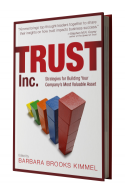Companies Ignoring the Social Fallout of Bad Customer Service
Will Find Themselves at a Competitive Disadvantage
I didn’t set out to write 3 blog posts in 24 hours, but what’s that expression about “striking while the iron is hot,” especially when the subject is trust?
This afternoon one of my sons and I headed out to run a few errands. First stop was Verizon Wireless to inquire about my data plan. There was no wait and customer service was fast and knowledgeable. Kudos to Verizon. Maybe Wednesday afternoons are the best time to visit!
Next we headed over to the home improvement store. Think The Home Depot or Lowe’s and my luck abruptly ran out. First stop was the door and window department. I needed to order a few window screens and brought the old ones with me to ensure the right purchase. Upon completion of the $70.00 order I politely asked the employee to discard the old screens. And then I heard one of my favorite lines, “Sorry our policy doesn’t permit it.” The employee turned his back and walked away.
We proceeded to finish shopping. I carried the screens (one was 6 feet long) while my son flat bedded 8 bags of mulch, and then off to checkout where I asked the checker whether there was a suggestion box in the store. “Suggestions? They must be made online and instructions are to be found on the back of the receipt.” She never asked if she could help me, and apparently had no interest in hearing my story, but I told her anyway. Her response, “Customers always try to hand off all sorts of trash to store employees.” According to the checker, if the store took the garbage that all the (evil) customers brought in the door, they would have to raise their prices. She then completed the transaction, handed me the paperwork for the screens I had ordered, along with a separate sales receipt and commented that she would be happy to attach them, but the store did not provide staplers at checkout… something about a policy. As we were leaving the store, my son asked me why I had even bothered to engage the checker in a conversation.
Moral of the story… I have no loyalty to this store. My experience today was pretty typical. Next time, I’ll just shop at their competitor a few miles up the road. And all because store #1 would not discard my screens, which might have been the right thing to do, policy aside. And finally, just a few years ago, a consumer facing a customer service issue had only a few avenues of recourse- a letter, a phone call or a glass of wine. Now the customer has an additional opportunity to report their story on social media, “outing” the offender should they choose to do so.
Companies recognizing that good customer service is an important component of a trustworthy organization build a competitive advantage called loyalty. They bank trust with their customers. They don’t have an intern standing by on Twitter to send a stock “I’m sorry” response when something goes wrong. They don’t need to do that. They have happy loyal customers and they have staplers.
Those interested in reading more about the history of customer service at both The Home Depot and Lowe’s, might want to read this great article from Babson.
Please share your comments and suggestions! Email: barbara@trustacrossamerica.com
Barbara Brooks Kimmel is the Executive Director of Trust Across America-Trust Around the World whose mission is to help organizations build trust. She is also the editor of the award winning TRUST INC. book series. In 2012 Barbara was named “One of 25 Women Changing the World” by Good Business International.




 AmeriHealth NJ @AmeriHealthNJ
AmeriHealth NJ @AmeriHealthNJ General Motors @GM
General Motors @GM


Recent Comments